Month: February 2024
Sue George • Director of Communications & Technology
February 29, 2024On a recent Saturday morning, I opened my inbox and read about how a respected New York Times journalist was scammed out of $50,000 for answering a call on her cell phone from someone “calling to check unusual activity on her Amazon account.”
The next article that popped up told about a social media post in which Jennifer Aniston promised to sell MacBook Pro computers for just $10. These scam videos on Facebook and Instagram used audio deepfakes of celebrities like Elon Musk, Oprah Winfrey, Tiger Woods, Kylie Jenner, and Vin Diesel to hawk fake product giveaways and investment opportunities.
Then there was a weekend last month when many of you reached out to Pastor Stephen because you received suspicious emails that looked like he sent them, but were really phishing emails from bad actors trying to hook you into falling for a scam.
As these bad actors refine the uses of artificial intelligence, all these kinds of scams will become more prevalent and more difficult to spot. What can you do to protect yourself?
First, be skeptical of every email, text message, and phone call you receive. Look carefully at the email address: is it really from the person claiming to send the message? If you can set your cell phone to block unknown callers, do it. If it’s an important call from someone not on your contact list, the person will leave a message that you can return right away.
Whenever an unknown caller asks for personal information or claims to be from your bank or a provider you use, HANG UP IMMEDIATELY. Then YOU call your bank or the provider and ask if they are trying to reach you.
Next, don’t just delete junk mail that comes into your inbox: instead, send it to your junk or spam folder. That action trains your mailbox to learn what is junk and what is legitimate email. It’s good practice to go into your junk/spam folder every week or two and scan through those messages to make sure it’s not holding good emails. Send the good stuff to your inbox (or mark as “not junk”) and erase the rest.
I’ve been very pleased with Gmail as an email provider. It’s free and does an excellent job of keeping junk mail out of my inbox. If you are using Verizon, AOL, or Comcast as your mail provider, I urge you to close that account and move to Gmail. Yes, it’s a hassle to make the change, but in the long run well worth the effort. You can do it in small steps over time, and before you know it, you’ll have made the switch.
Topics like these come up every week in Tech Time, the Zoom gathering I’ve been hosting every Monday afternoon from 1-2 pm since the pandemic started in 2020. Some regulars have been with me from the beginning, and new folks drop in regularly to ask a question or share a good idea they’ve learned. I love having the opportunity to learn something new every week, because I sure don’t have all the answers. Together we’ve tackled questions about using cell phones and iPads, tested new Zoom features, discussed whether password managers are a good idea (yes!), learned how to take screenshots and how to use CarPlay, and much more. Recently Derry member Lauren June dropped by and presented an excellent tutorial on Pinterest.
I invite you to join us on any Monday afternoon that works in your schedule: just click this link. You’re welcome to drop in, ask a question and duck out, or stick around for the hour. If there’s a topic you’d like to know more about, let me know and we’ll make it happen.
Tech Time started as a way to practice using Zoom when it was new to all of us, and it’s continued because technology is constantly evolving and changing, and it’s not easy for any of us to keep up. Just having a forum to share frustrations, ask questions, and learn how to stay safe has been helpful. I hope you’ll join us.
A Matter of Balance
February 28, 20242-4 PM MONDAYS, APR 1 – MAY 20 IN ROOM 7 • FREE!
Many older adults have concerns about falling and restrict their activities. A MATTER OF BALANCE is an award-winning eight-week program designed to manage falls and increase activity levels. Sessions will be presented by Amy Bollinger, BSN RN TCRN.
This program emphasizes practical strategies to manage falls. Participants will learn to:
- View falls as controllable
- Set goals for increasing activity
- Make changes to reduce fall risks at home
- Exercise to increase strength and balance
Who should attend?
- Anyone concerned about falls
- Anyone interested in improving balance, flexibility and strength
- Anyone who has fallen in the past
- Anyone who has restricted activities because of falling concerns
Sessions will follow Prime Timers (except on Easter Monday, April 1, when there will be no Prime Timers). RSVP requested, not required: email Beckie Freiberg, RN
Holy Week at Derry Church
February 28, 2024Worship on Maundy Thursday, March 28
7 PM IN THE SANCTUARY WITH COMMUNION AND LIVE STREAMING, LED BY PASTOR STEPHEN AND SHAWN GRAY
This year’s Maundy Thursday service, “Seven Actions,” is an alternative to a traditional Tenebrae liturgy. The liturgy focuses on the account of the Last Supper in John 13. Seven candles are lit during the service in response to seven actions, which are noted during the narrative. The lit candles offer a reminder of the presence of light even in the darkness of the eve of Good Friday.
Worship on Good Friday, March 29
7 PM IN THE CHAPEL LED BY PASTOR STEPHEN AND LITURGISTS
“Seven Moments” is our Good Friday service of prayer and reflection recalling seven moments during the day of the death of Jesus based on the Gospel of John. After each reading, one of seven candles that were lit on Maundy Thursday will be extinguished, as in a traditional Tenebrae service.
Worship on Easter Sunday, March 31
8 & 10:30 am worship in the Sanctuary with Derry Ringers, Sanctuary Choir, brass quartet, and Bob Nowak on percussion. Live streaming at 10:30 am. No church school classes, 11-Minute Lessons or KIWI.
8:30-10 am breakfast in Fellowship Hall: your donation supports the 2024 mission trip to the Dominican Republic (Bridges to Community)
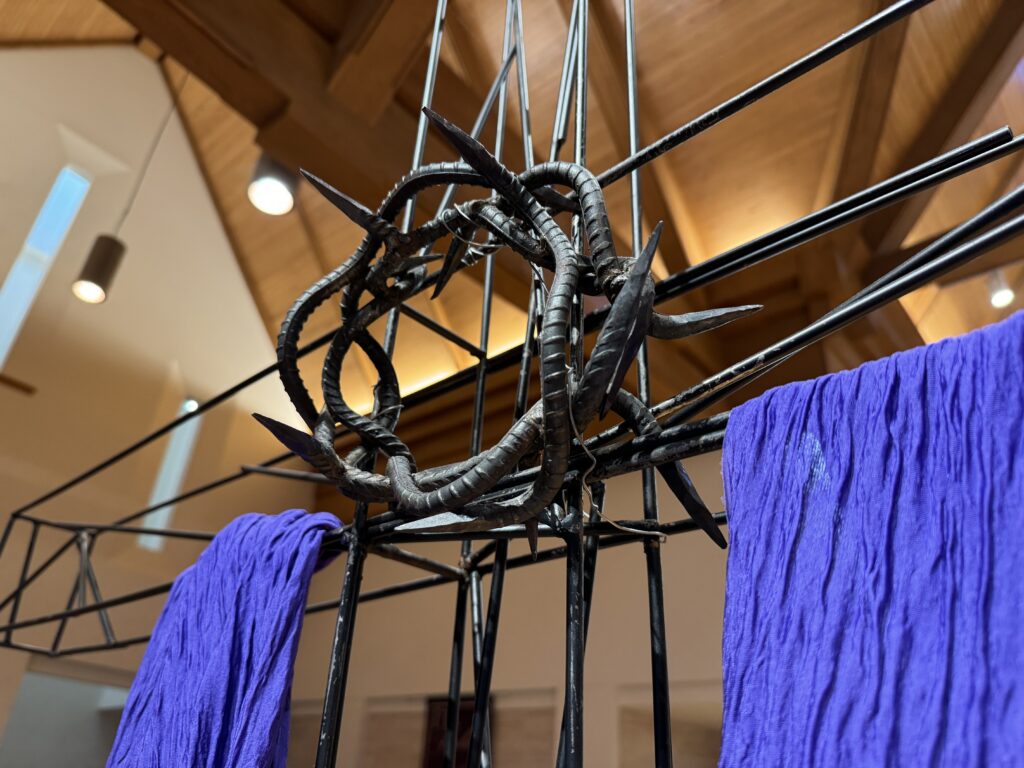
Meet the Candidate for Carlisle Presbytery’s Co-Leader for Vision and Transformation
February 28, 2024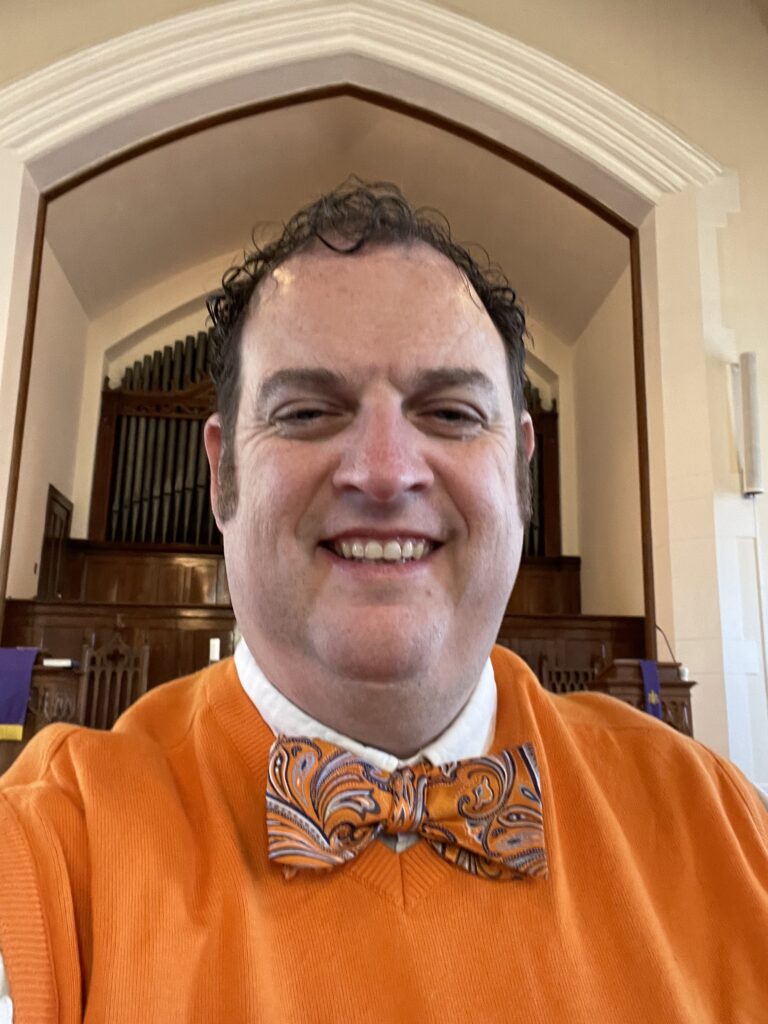
MONDAY, MAR 11 AT MIDDLE SPRING PRESBYTERIAN CHURCH, SHIPPENSBURG; 5 PM MEET & GREET WITH DINNER (IN PERSON ONLY) • 6:30 PM WORSHIPFUL MEETING (HYBRID)
- Meet and welcome the Rev. Dr. James (Jamie) McLeod, candidate for the position of Presbytery Co-Leader for Vision and Transformation
- Share a meal with your fellow Presbyters
- Sing in the pick-up choir
- Connect, celebrate, and enjoy one another’s company
Presbytery meeting materials including Rev. McLeod’s spiritual autobiography and Statement of Faith are on the Presbytery website. More materials and details will be shared in coming weeks.
Dinner will be served in the social hall from 5–6:30 pm, arrive at your convenience. If you cannot attend in person, join the meeting portion beginning at 6:30 pm on Zoom.
Register to participate via Zoom here. To attend in person, register here.
Read About Peace and Justice
February 28, 2024Five books for the Presbyterian Women’s Peace and Justice online book discussion are now in our library: The Immortal Life of Henrietta Lacks (616 Ski); Transforming (267 Har); A Place Called Home (Bio- Amb); Poverty in America (362 Des) and Our Missing Hearts (Fic- Ng). On Mar 10 the group will discuss Our Missing Hearts. Read more and register online.
See Derry Youth in “Seussical,” the 2024 Hershey High School Musical
February 28, 20247 PM FRIDAY & SATURDAY, MAR 1 & 2 AND 1:30 PM SUNDAY, MAR 3 AT THE HERSHEY HIGH SCHOOL AUDITORIUM • CLICK FOR TICKETS
Enjoy seeing your favorite Dr. Seuss characters come to life in a musical adventure that showcases the powers of friendship, loyalty, family and community. Participating Derry Church youth include Ryan and Adele Hosenfeld, Alex Patton on the stage crew, and dancer Morgan Owsley.
An Afternoon of Jazz with the Presbybop Quintet
February 28, 20244 PM SUNDAY, MAR 10 AT FAITH IMMANUEL PRESBYTERIAN CHURCH, 1801 COLONIAL ROAD, HARRISBURG • FREE!
Bill Carter, jazz pianist and Presbyterian minister, leads Presbybop Music — his his attempt to integrate his strong Presbyterian faith with the rhythms of bebop. Based in northeastern Pennsylvania, this consort of consummate professionals has presented concerts and jazz worship services in churches and venues around the country (including Derry Church) to wide acclaim. Bill spends most of his time as a busy pastor, yet he keenly senses that God wants him to use his musical gifts as a means of reaching people with the good news of God’s grace, peace, and joy. His jazz ministry has received national recognition and has served as a model for integrating the arts in Christian ministry.
Shawn Gray • DIrector of Christian Education
February 22, 2024“Neighbor” is an idea that we are familiar with. A very well-known story about being a neighbor is the Good Samaritan. Mr. Rogers asks, “won’t you be my neighbor?” The language of neighbor is common, but like many frequently used words, the depth of meaning can be lost in the frequency of use. Two pivotal questions we can glean from the Good Samaritan story in Luke are, “who is our neighbor?” and “how do we love our neighbor?” These questions are very important for us and for the church to consider.

Often, we think in terms of membership and how to incorporate others into our community. However, being a neighbor does not require incorporation. We see this with the Samaritan man as he stays the Samaritan man throughout the entire story. We also understand neighbor to mean a person or group who is close to us, or those with whom we are most likely to interact. Our current age of interconnectedness would have this definition include all people. The Guardian wrote an article where researchers checked 30 billion electronic messages and found that we can be connected to anyone through 6.6 people, beginning with someone you know.
By studying billions of electronic messages, they worked out that any two strangers are, on average, distanced by precisely 6.6 degrees of separation. In other words, putting fractions to one side, you are linked by a string of seven or fewer acquaintances to Madonna, the Dalai Lama and the Queen. (Smith, 2008)
The ways in which we interact with the world are vastly different now than 30 years ago as we have entered this age of connection where millions of people are accessible through the phone in our pocket.
While the number of our neighbors have grown, I wonder if the way we are to love them has stayed the same. How do we as individuals or as a church love our neighbors? The Samaritan recognized the needs of his neighbor and provided for him. Fred Rogers created a television show with the message that we are all valuable and special.
There is a special story about Fred Rogers learning about and providing for the needs of another. Fred Rogers would feed his fish on every show, and while he fed his fish, he would narrate that he was feeding his fish. He began narrating this without any public explanation. It was later understood that Fred Rogers received a letter from a concerned little girl who was blind and worried that Mr. Rogers’ fish were hungry because she never heard him feeding them. Mr. Rogers responded to this by making sure to narrate his feeding of the fish so the little girl would not worry.
Every situation is unique and there is not one prescription for how to love all our neighbors. However, if we look and listen to those we share the world with, we will find many opportunities to be a good neighbor.
Feb 2024 Financial Snapshot
February 21, 2024Cash Flow – Operating Fund as of 1/31/24:
| YTD | BUDGET | |
| Income YTD: | $216,036 | $110,233 |
| Expenses YTD: | $74,530 | $117,976 |
| Surplus/(Deficit) YTD: | $141,506 | ($7,743) |
It’s Time to Support the One Great Hour of Sharing
February 21, 2024Derry Church receives the One Great Hour of Sharing Offering in the season of Lent, continuing through Easter Sunday, March 31. Last year Derry raised $18,996: can we top that in 2024? Half will go to the Presbyterian Church (USA) in support of three progams (Presbyterian Disaster Assistance, Presbyterian Hunger Program, and Self-Development of People), and half will go to Bridges to Community for construction of a house in the Dominican Republic. Find OGHS envelopes in the pew racks or give online. Watch this video to learn about the impact the One Great Hour of Sharing Offering has had over the last 75 years:
Native Peoples Titles Now Available in the Ruth Codington Library
February 21, 2024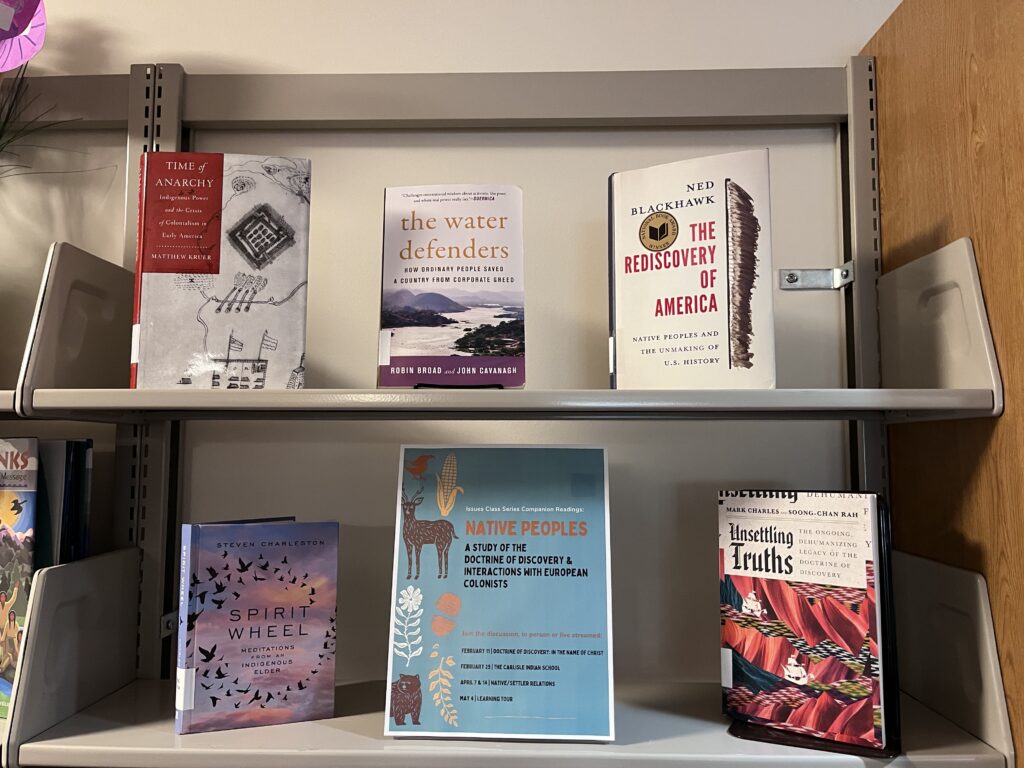
The Ruth Codington Library now features books written by and about Native Peoples, their interactions with European colonists, and the Doctrine of Discovery. There are titles for adults and children. These books stand alone, or serve as great companion reading for the Issues Class series taking place in the Sunday School hour:
• February 25: The Carlisle Indian School
• April 7 & 14: Native/Settler Relations
• May 4: Learning Tour
Thanks to Meara Kwee for helping to cultivate this new library experience. The Ruth Codington Library can be found just inside Entrance #1 on the lower level of the church. Featured titles are on the rear wall above the checkout station.
Take a Walk In Her Shoes
February 21, 20249 AM – 12 PM SATURDAY, MAR 16 AT HERSHEY FREE CHURCH/CORE CAFE • REGISTER BY MAR 9
At this interactive workshop presented by She’s Somebody’s Daughter and Sgt. Wendy Burgwald, Derry Township Human Trafficking Investigator, you’ll learn more about the problem of human trafficking not only in the USA or in Pennsylvania, but right here in Derry Twp. You’ll learn some key definitions, tips on what to be looking for, and have your thoughts about human trafficking challenged.
The morning opens with a simulation: you’ll have the opportunity to walk the journey of a girl in human trafficking. You’ll be presented with different scenarios and will face obstacles and choices along the way as you walk in her shoes. $10 for adults, $5 for students with half the fees going to support She’s Somebody’s Daughter.
Resources to Guide Your Lenten Journey
February 21, 2024The agencies of the Presbyterian Church (USA) offer a variety of devotional and worship resources for Lent. Click here to view the list that includes books and online resources. Click the image below to view and download a simple reflection-action calendar created by the Presbyterian Hunger Program with the hope that it will be the beginning of actions intended to create more mindful behaviors throughout the year.

Meet Aman, One of Derry Church’s PEB Scholarship Recipients
February 21, 2024Dear Donor, Greeting in the name of our Lord Jesus Christ. I am from Sargodha, a city famous for it oranges. Dear Donor, I study in class Pre-Nine. Thank you very much for your support and helping me in my studies. I want to become a army officer. My favorite subject is computer sciences. I love coming to school because it is one of the biggest school in Sargodha. Your support is like a silver lining behind the dark clouds. It means a lot to me. Thank you again.

For 13 years, Derry Church has maintained a partnership with the Presbyterian Education Board in Pakistan. PEB operates 25 schools, primary through high school, including some boarding schools, that serve more than 5,900 students. Derry, through the Friends of Sargodha group, has a particular relationship with the schools in Sargodha.
Friends of Sargodha’s goal is to continue to provide ten scholarships every year. You can help.
A full scholarship for a day student is $400 a year, about a dollar a day. We are dividing that amount into ten shares, $40 each, to offer you the opportunity to support a portion of a scholarship.
You can purchase one or more shares by writing a check to Derry Church notated “Pakistan Scholarship” or online through the church website.
Learn more:
- Read Eleanor Schneider’s message inviting you to participate
- Read about PEB Schools and all that’s been accomplished in the past 25 years
This fundraiser continues through February 2024
C. Richard Carty • Derry Member
February 15, 2024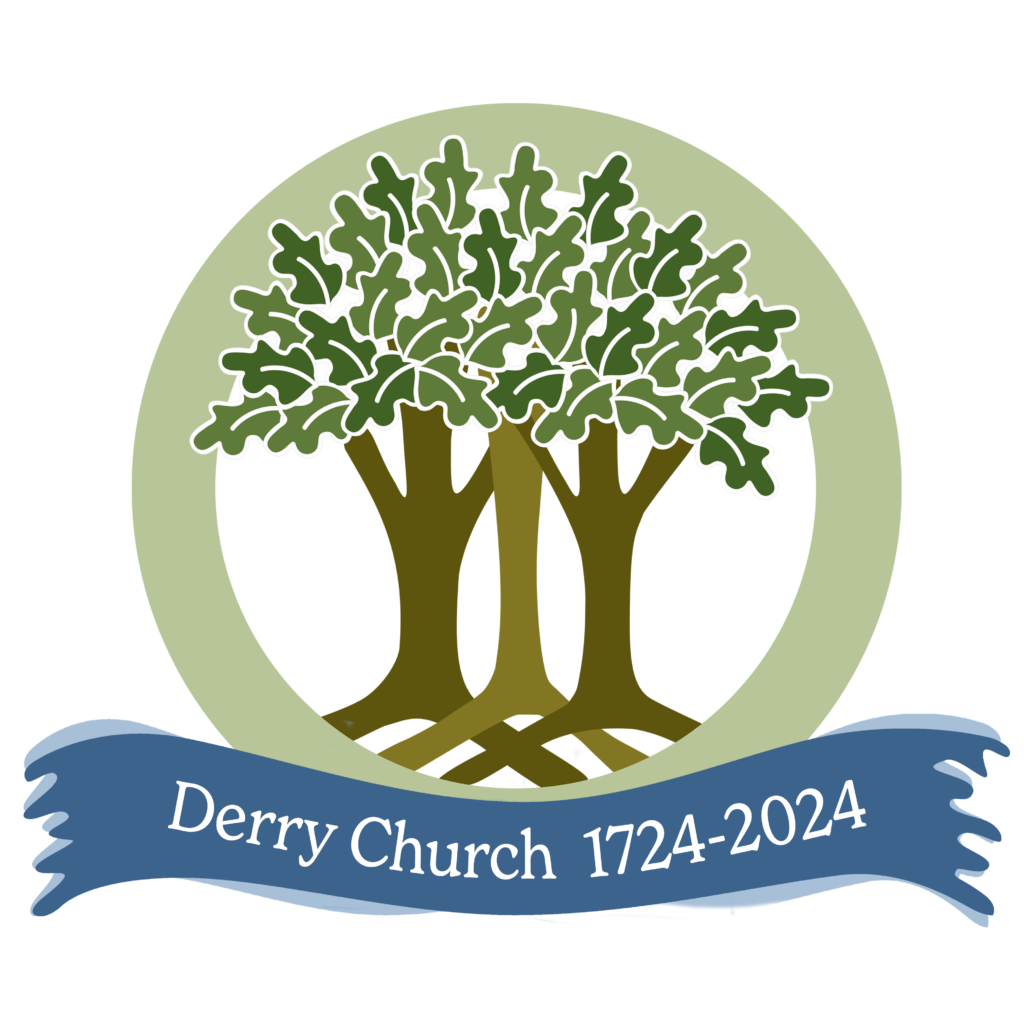
Facing religious discrimination and economic and political pressure in Ireland in the early 18th century, thousands of Ulster Scots saw a dismal future with little hope of providing a good life for their families. Their Presbyterian faith led them to believe that by working hard and following Christian practices, God would give them a good life.
Across the Atlantic Ocean, William Penn had established a colony founded on the practices of religious toleration, participatory government, and “brotherly love.” Scots-Irish immigrants learned that Pennsylvania had opportunities and available land to free them from the financial, social, and political difficulties they faced in Scotland and Ireland.
William Penn founded his colony on Quaker principles of non-violence and religious toleration and believed white Christians, indigenous Christians, and non-Christians could live peacefully together.
In 1682 Penn purchased land from the Lenape tribe and hoped to sell it to settlers to pay off his debts. He also desired to foster trade with the Native Americans and establish a military defense for residents. In his book, Peaceable Kingdom Lost, historian Kevin Kenny noted that after the Great Agreement of 1701, Penn and the Conestogas promised to live together peacefully. The humane treatment of the indigenous people was an essential segment of Penn’s vision.
Around 1700, the Ulster Scots began leaving Ireland for a new life in Pennsylvania. Arriving in Philadelphia and Delaware ports, it did not take long for them to feel unwelcome. The Quakers who ruled the new colony did not always follow Penn’s practice of absolute religious toleration. Numerous restrictions were placed on non-Quakers, limiting their full participation in the colony’s political, social, and economic life.
Since most of these immigrants were tenant farmers, living in and around Philadelphia did not offer the opportunities they desired. At this time, Pennsylvania’s frontier was 40-50 miles west of Philadelphia, including what later became Lancaster and Lebanon counties.
Many Indian trails crisscrossed the rolling hills and forests. Such an Indian trail passed near the spring that ran behind Derry Church. The trail stretched from the Manada Gap to the headwaters of the Conewago Creek. These trails were rough and rocky. However, the determined Presbyterian, Mennonite, River Brethren, and Moravian immigrants made their way westward in increasing numbers. So many were coming, and their arrival seemed like a swarm of bees.
While Penn insisted on legitimately purchasing Indian lands, these newcomers felt the land was theirs. “It was against the laws of God and nature that so much land should be idle, while so many Christians wanted it to labor on and to raise their bread,” wrote Israel Daniel Rapp, in his 1847 book, History and Topography of Northumberland, Huntington, Mifflin, Union, Columbia, Juniata, and Clinton Counties, Pennsylvania.
Settlers occupied the hills around the settlements in Pennsylvania. They marked their property by cutting their initials in trees on the boundary of what they considered theirs, then cut circles in the bark to kill the tree. They refused to pay the Native Americans for the land, believing that God owned it.
According to historian Luther Kelker, the settlers would build a church soon after clearing some land, building simple dwellings, and planting crops. The farmers often did not remove tree trunks and roots, and simply planted them with crops set out around them. They often planted various grains, beans, peas, and turnips.
The settlers kept goats, pigs, cattle, sheep, and a horse or two for plowing. As time passed, settlers often built grist mills and tanneries, with distilleries often added later. Colonial wives spun flax, milled the corn, worked in the fields, while bearing and raising large families of up to 10-15 children.
Days were long and strenuous, but the men would gather at the tavern to exchange stories and catch up on local and international news . Magisterial courts met there, and the taverns often served as polling places.
While German farmers were frugal, well-organized, and interested in improving the land, the Scots-Irish settlers were not known for being good stewards of the land. They often farmed the soil while it was fertile and then moved westward when the soil stopped being productive.
While working to create a good life on the frontier, immigrants saw the need to establish a church. In the early 1720s, at least three Presbyterian congregations began gathering for worship. For the Derry congregation, at first worship was held outside, by a spring. At times, worship services would be held in homes.
As the Presbyterian congregations grew, these new worship communities requested formal recognition as a congregation from the Presbytery. After several years of meeting without the leadership of an ordained minister, members of Derry Church applied to Donegal Presbytery In 1729 to be recognized as an established church and to request that they be served by an ordained minister. In response, Donegal Presbytery directed Reverend James Anderson, then serving as Pastor to Donegal Springs Presbyterian Church, to attend to Derry Church every fifth Sunday.
In 1732, when Derry called its first pastor, Reverend William Bertram, a small log building, the Session House, was erected. In 1734, a second structure was built to serve as a sanctuary. In 1769, a larger structure the “Old Derry” Meeting House was constructed.
On the frontier, the church became an important social center. People traveled long distances to attend day-long worship services often held just once per month. Services began around 10 a.m. and included two sermons, hymns, and prayers. Between discourses, adults lingered in small groups discussing local happenings while children and youth enjoyed playing with each other. At noon, the entire congregation settled underneath the trees to enjoy picnics brought from home.
Presbyterian ministers were hard to find on the frontier. The Presbyteries required ministers to have a classical education, including theology, Greek, and Latin before they could be considered for ordination. If the itinerant preachers did not have this background, the Presbyteries required them to return to Scotland to study at Edinburgh University. Once Princeton was established (1746), most ministers received their training there.
Because of the shortage of qualified ministers, it was common for a clergyman to serve more than one church. Reverends James Anderson and William Bertram, Derry’s earliest ministers, both served several congregations, often visiting newly established congregations a few times a year, in addition to their more regular service to their called church.
During these years, social, economic, and political challenges were plentiful. While most descendants of the Scots-Irish settlers moved on as the soil became less productive, they left an enduring heritage in this area. Building upon their religious and political views, they laid the foundation for our new nation and the challenges ahead.
For further reading:
Kelker, Luther Reilly. History of Dauphin County, Pennsylvania. United States: Lewis Publishing Company, 1907.
Kenny, Kevin. Peaceable Kingdom Lost: The Paxton Boys and the Destruction of William Penn’s Holy Experiment. New York: Oxford University Press, 2009.
Rapp, Israel Daniel. History and Topography of Northumberland, Huntington, Mifflin, Union, Columbia, Juniata, and Clinton Counties, PA. (1847)
Hymn Festival
February 14, 20244 PM SUNDAY, MARCH 17 IN THE SANCTUARY, IN PERSON ONLY • FREE WILL OFFERING
Whether you enjoy singing hymns or listening to hymns as a way to pray and hear scripture, this concert is for you! Linda Tedford, Artistic Director, Founder and Conductor of the renowned Susquehanna Chorale, will direct a program in celebration of Derry’s 300th anniversary year as we sing about God being our rock and guide through the centuries. Hymns include “How Firm a Foundation,” “A Mighty Fortress Is Our God,” John Calvin’s “I Greet Thee Who My Sure Redeemer Art,” “Praise Ye The Lord, The Almighty,” and more.
Our augmented Sanctuary Choir will sing some hymns, and the congregation will join in singing five hymns. The Derry Ringers will play, along with brass, percussion, strings, flute and clarinet, piano and organ. In between selections, you’ll hear more about Derry’s history that originated in Scotland and Northern Ireland. What better way to celebrate St. Patrick’s Day than by singing glorious hymns with your church family, friends and neighbors!
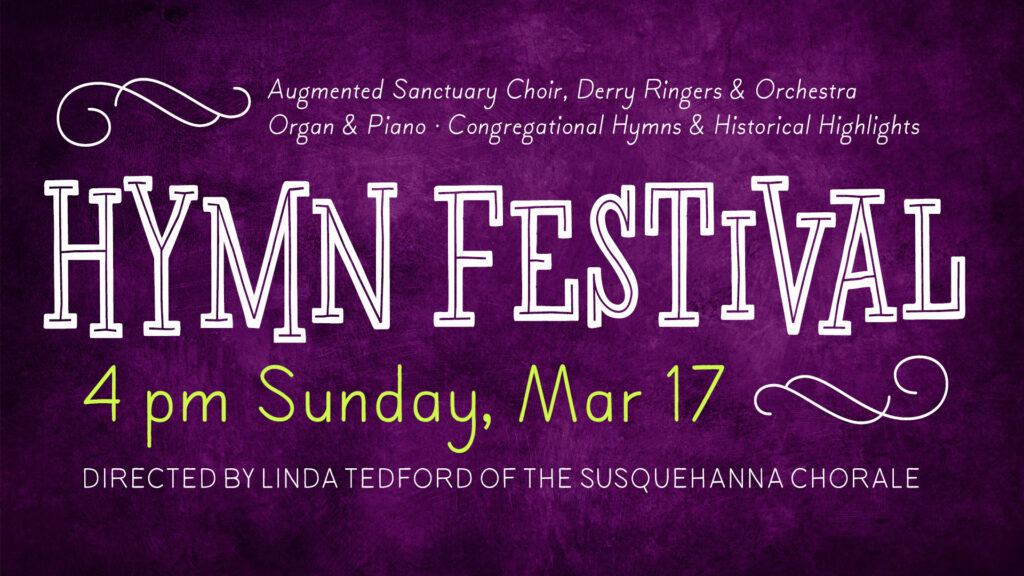
Meet Areeba, One of Derry Church’s PEB Scholarship Recipients
February 14, 2024Hello dear donor! I want to say “thank you” for all your support towards me. I am in class 3. I study in EMS Girls High School. My father is a carpenter and my mother is a housewife. We are a big family. I wish to continue my studies and wish to become a designer. My all dreams can be fulfilled because of your kind support. You are an angel on the earth for many. I am one of them. Thank you for being my support. I always pray for you and your family.

For 13 years, Derry Church has maintained a partnership with the Presbyterian Education Board in Pakistan. PEB operates 25 schools, primary through high school, including some boarding schools, that serve more than 5,900 students. Derry, through the Friends of Sargodha group, has a particular relationship with the schools in Sargodha.
Friends of Sargodha’s goal is to continue to provide ten scholarships every year. You can help.
A full scholarship for a day student is $400 a year, about a dollar a day. We are dividing that amount into ten shares, $40 each, to offer you the opportunity to support a portion of a scholarship.
You can purchase one or more shares by writing a check to Derry Church notated “Pakistan Scholarship” or online through the church website.
Learn more:
- Read Eleanor Schneider’s message inviting you to participate
- Read about PEB Schools and all that’s been accomplished in the past 25 years
This fundraiser continues through February 2024
PW Circle Meeting & Bible Study
February 14, 20241 PM WEDNESDAY, FEB 21 IN THE LOUNGE
“A Person with Physical Disabilities Encounters Jesus” is the topic for this month’s PW Circle meeting and study based on Acts 3:1-10. Bring your favorite Bible. All women are invited to participate in the discussion as we consider how we can be inclusive.
Derry Dads Fellowship & Games
February 14, 20246:30 PM THURSDAY, FEB 29 IN THE YOUTH ROOM
Join the Dads of Derry for snacks and conversation. We’ll also play some jackbox games, so bring a smart phone.
How to get there: Use Door #5 to enter directly into the Youth Room from the back parking lot. Or come in door #4, go up the steps, turn left and go up a few more steps, then turn right and go down the stairs.
Courtney McKinney-Whitaker • Derry Member
February 8, 2024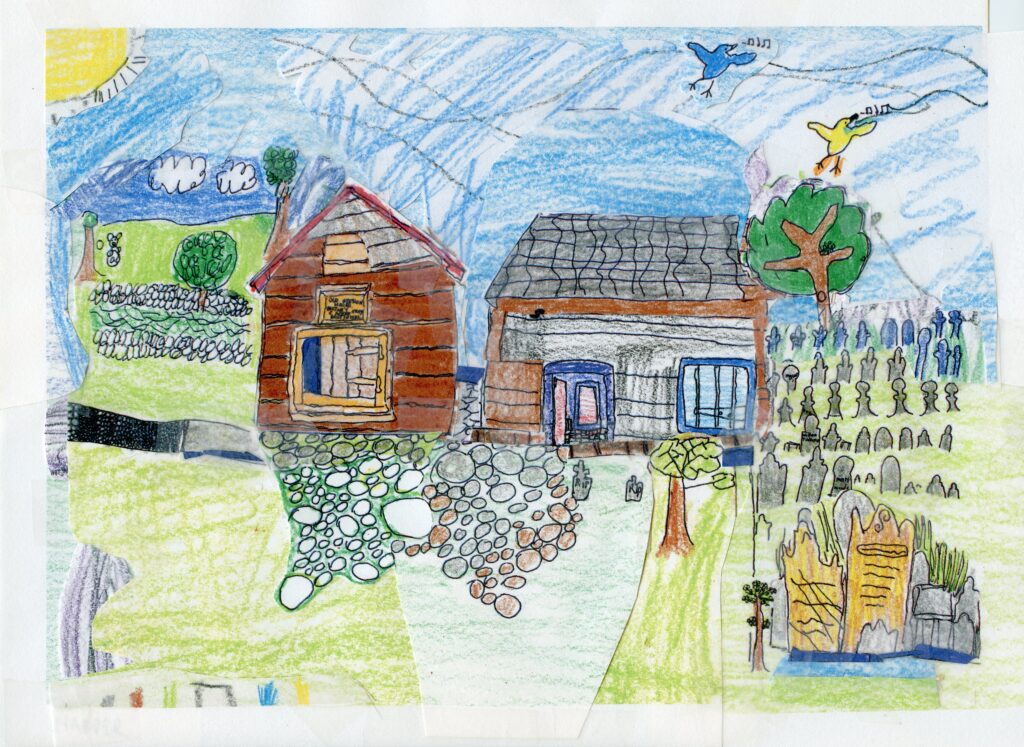
Over the past several months, Jill Peckelun and I have had the privilege of working with Derry’s 3rd-5th graders on a picture book history of Derry Church. We are often joined by Pam Whitenack, who answers many questions about Derry’s history on the spot, and Kristy Elliot, who provides student support.
Plans for this project emerged last year as the Derry 300 Committee imagined ways to include children’s voices in the Derry 300 celebrations. During the 2023-24 program year, Jill and I have met with an average of about ten children per week during Creation Time on Tuesday evenings to write and illustrate the story of Derry Church.
We decided to tell the story through the evolution of Derry’s physical space. 3rd-5th graders are just developing the capacity for the kind of abstract thought that deep study of history requires, so we decided to connect all the abstract names, dates, and ideas to a space they already knew well and now know even better—their own church.
We divided our project into several topics. So far we have written and illustrated pages about the Session House, Spring, and Cemetery, Old Derry, and the John Elder Memorial Chapel. Jill and I have developed the following process for researching, illustrating, and writing about each topic.
First, we do a site visit to a relevant location in the church to draw from life, or we draw from pictures in Derry’s archives. Jill takes the children’s sketchbooks and painstakingly selects images from each of the children’s drawings to create a composite collage. Next, the children use crayons to add color to the composite image. Jill then repeats the process, creating the final image by scanning and collaging the color images. We’d like to thank Sue George for lending her technical expertise to aspects of this process.
Through this process, I’ve been able to introduce some of the concepts of historical work, including primary sources (those contemporary to the period under study) and secondary sources (those created later from primary sources). Primary sources used on this project include photographs, artifacts, and of course, the building itself. For our secondary source, we rely on Bobbie Atkinson’s April 27, 2023 Long Read, which details the history of our buildings. We begin our study of a particular topic by reading the relevant portions of this article to get a general overview, and we revisit it throughout our study.
To produce the text, I begin by listening to the children talk as they work. Sometimes I ask them questions about what they are drawing and why. I note what they tell me. Toward the end of the process, I ask, “What did we learn? What do we feel is important for others to know?” I note that down, too. Finally, I take all the language they have given me and shape it into a narrative.
My star word for 2024 is delight, and it has truly been a delight to work on this project. Here are a few of the standout moments:
- Taking the children outside to sketch the Session House, Cemetery, and Spring. It was such a blessing to hear their kind words for the saints resting in our cemetery, those they knew and those who lived long ago. Several of them asked if there was any way to go inside the Session House, so we are working on possibilities for taking them in one or two at a time when it is safe. I have learned that kids love the Session House! (It’s a little house under glass in the parking lot. Who wouldn’t?)
- Participating in a Tuesday night worship service. In November, Pastor Stephen led a Tuesday evening worship in the Chapel with communion. The kids sat around the chancel to sketch the artifacts that remain from Old Derry, including furniture and the pewter communion set.
- Watching the kids get so excited about artifacts from the Heritage Room! We meet in Room 6, which is conveniently located next to the Heritage Room. It was such a joy to see the kids show so much interest in the various objects Pam Whitenack pulled out one evening and debate with each other and us about their possible uses.
- Helping a table of kids study images of the Chapel to put them in chronological order—an activity they began spontaneously out of their own interest.
- Meeting with a small but dedicated group the night of a snowstorm to tour the chapel with Pam and ring the bell.
It’s not often in life you realize you’re doing one of the most important things you’ll ever do while you’re doing it, but I have experienced that feeling while working with these children on this project.
Jill and I are often astounded by the children’s work, by their wisdom and talent. Looking with new eyes, they often show us things we missed. I hope that the children who work on this project will take the skills and confidence and knowledge they’ve gained into whatever they do next and into their eventual vocations. I don’t call this a children’s book, because it isn’t just for children. It’s a picture book, and picture books are for everyone.
You’ll have your opportunity to pre-order this one in the spring. In the fall, we will celebrate the book’s arrival with a book launch party at a special post-worship fellowship.
Thank you for your support of the children and this project. To learn more, check out the bulletin board across from Room 6 or ask a 3rd-5th grader about their experience. We look forward to sharing the book with you.
Join the Be-A-Blessing Challenge and Support our Confirmands
February 7, 2024Our 2024 confirmation students have been given $100 to bless an organization, mission, or cause they are passionate about. The students aren’t just donating $100: they are using it to start something with a bigger impact.
In Sunday worship, three of our confirmands will tell you about their projects. Alex Patton is helping create a mobile library for Logos Academy in Harrisburg.
Emmie Achorn is collecting needed items for the Harrisburg Humane Society. To support Emmie’s project, donate items from this wish list. Drop items in the designated basket in the church’s mission closet.
Anne Burke is creating gift baskets to share with cancer patients in memory of her grandfather. To help Anne get the supplies she needs to fill the baskets, you can purchase from this Amazon wish list. Drop items in the designated basket in the church’s mission closet.
CWS Blankets = Compassion in Action
February 7, 2024The Church World Service Blanket program is about sharing love. Through this simple act of kindness, amazing things can happen. The program includes heavy wool blankets, lightweight acrylic blankets, school kits, hygiene kits and cleanup buckets. These provide relief immediately after a disaster or help to recover after an event. Last year 32,785 blankets were delivered to needy persons.
When Kentucky was hit with tornadoes in several small towns, Grandma Constance handed a blanket to her 4 year-old grandson Roland to bring him a sense of comfort and safety while they were staying at a temporary shelter. Roland carries his blanket with him everywhere he goes. He says it protects him in case another tornado comes. Click to read more stories.
Behind every kit and blanket, there is a prayerful and enthusiastic donor. By reaching out to help others, you create a ripple, an act of kindness which will spread the love we all need to be a part of. It’s easy to donate: you can place cash in designated envelopes available in the pew racks, then place in the offering boxes. Or make checks payable to PW in Derry notated “Blanket Fund” that can be sent to the church office or placed in the offering boxes, or give online. Thank you!
Meet Roshal, One of Derry Church’s PEB Scholarship Recipients
February 7, 2024
Greetings in the name of our Lord, Jesus Christ. I am a student of class 8. The name of my school is P.E.B. Boys’ High School Sargodha. Dear donor, I cannot find words to show how grateful I am for supporting me in my studies. It means a lot for me. It will help me to make my dreams come true. Thank you once again.
For 13 years, Derry Church has maintained a partnership with the Presbyterian Education Board in Pakistan. PEB operates 25 schools, primary through high school, including some boarding schools, that serve more than 5,900 students. Derry, through the Friends of Sargodha group, has a particular relationship with the schools in Sargodha.
Friends of Sargodha’s goal is to continue to provide ten scholarships every year. You can help.
A full scholarship for a day student is $400 a year, about a dollar a day. We are dividing that amount into ten shares, $40 each, to offer you the opportunity to support a portion of a scholarship.
You can purchase one or more shares by writing a check to Derry Church notated “Pakistan Scholarship” or online through the church website.
Learn more:
- Read Eleanor Schneider’s message inviting you to participate
- Read about PEB Schools and all that’s been accomplished in the past 25 years
This fundraiser continues through February 2024
Place Your Order for Easter Lilies
February 7, 2024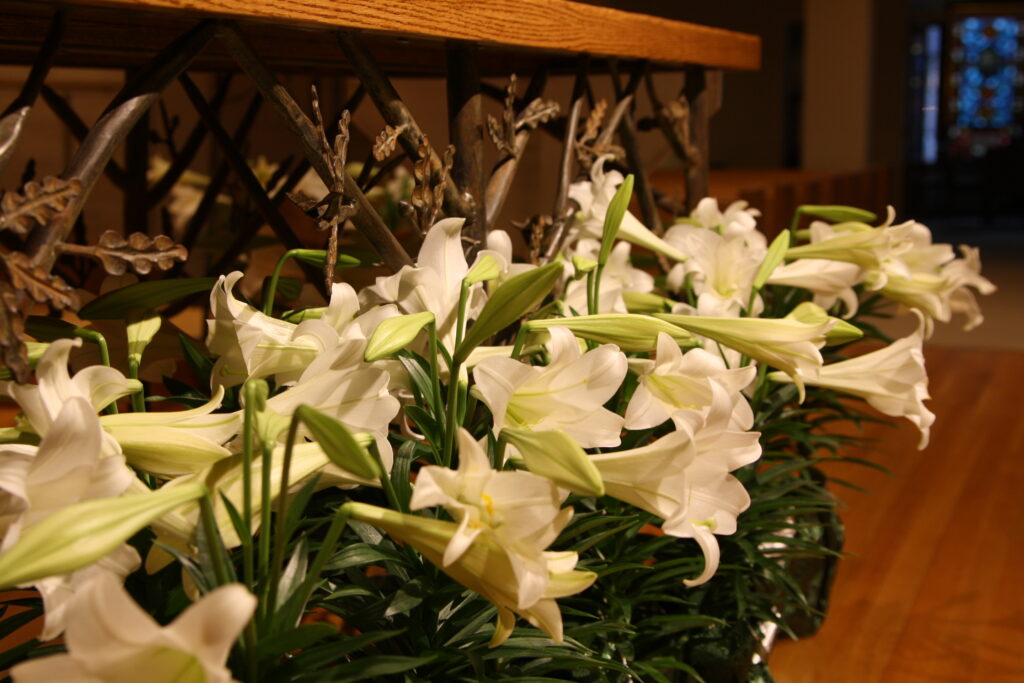
Order Easter lilies in honor or in memory of loved ones by filling out and returning forms available at the insert rack. Plants will decorate the Sanctuary on Easter Sunday and you can take them home after the 10:30 am service. Plants are $10 each: order by Sunday, March 3.
Susan Ryder • Community Outreach Associate, Family Promise of Harrisburg Capital Region
February 1, 2024Editor’s Note: On the first Thursday of each month, the eNews feature article highlights the mission focus for the month. In February we’re lifting up homelessness and our mission partner, Family Promise of Harrisburg Capital Region.
Steve came to Family Promise HCR with his 12-year-old son and two-year-old daughter. They had spent the last year in a hotel, and the expense chewed through their savings. The next step was living in his car, which would place him in danger of losing custody of his children.
That’s when they applied to Family Promise HCR. He entered the program in a very stressed state, with a constant knit in his brow. Unfortunately, stories like his are not unique.
Family Promise HCR has spent the last year:
- Housing 14 families, including 23 children.
- Beginning the UP programs in July 2023:
- Move UP assists with back rent and security deposits: 23 families benefited.
- Wheels UP provides funds for car repairs and back car payments: seven families benefited.
- Heads UP assists with mental health visits for those who have experienced homelessness.
- Working with 100 individuals looking for work, as a program management site for the United Way’s Road to Success program.
Our UP programs and Road to Success help divert families from homelessness. This is so important, because once a family has an eviction, it is much harder for them to find a landlord willing to rent to them.
We don’t do this alone. We are a part of over a dozen coalitions or groups throughout the area representing hundreds of partner service organizations. This includes the Brethren Housing Association (BHA), where we hold a Road to Success “Job Club” and Capital Area Coalition on Homelessness, where Stacey Coldren, our Program Director sits on the board. We work with the Healthy Steps Diaper Bank to receive diapers for our guests. And we partner with organizations including Christian Churches United to share resources whenever possible, like the over abundance of hats and scarves we received and donated to the Overnight Women’s Shelter.
Our families stay in our Day Center during the day, and in the evening stay at our network of ten host congregations. They transform three rooms into a cozy space to shelter our families in the evenings, and provide an evening meal and hospitality.
Steve graduated from the program. A local congregation that wanted to use one of its rental properties for mission work rented to him and his family. They gave him a reduced rate and took a chance on his rough credit report. This month it’s been one year since the move and the family is thriving! No more knit in his brow.
